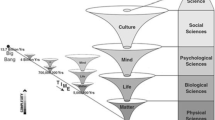Abstract
The differential contributions of J. R. Kantor and B. F. Skinner for the construction of a scientific psychology are analysed through Kuhn’s notions about rules of correspondence between language and nature and exemplary rules in scientific problem solving.
Similar content being viewed by others
References
BECHTEREW, W. Von (1913). Objecktive psychologie oder psychoreflexologie. Leipzig.
FULLER, P. R. (1973). Professors Kantor and Skinner—The “Grand Alliance” of the 40’s. The Psychological Record, 23, 318–324.
KANTOR, J. R. (1917). The functional nature of the philosophical categories. Doctoral thesis, University of Chicago.
KANTOR, J. R. (1919). Psychology as a science of critical evaluation. Psychological Review, 27, 50–72.
KANTOR, J. R. (1924-26). Principles of psychology. New York: Alfred Knopf.
KANTOR, J. R. (1958). Interbehavioral psychology: A sample of scientific system construction. Chicago: Principia Press.
KUHN, T. S. (1962). The structure of scientific revolutions. Chicago: The University of Chicago.
KUHN, T. S. (1974). Something else about paradigms. In F. Suppe (Ed.), The structure of scientific theories (pp. 459–482). Urbana: University of Illinois Press.
MACE, C. A. (1948). Some implications of analytical behaviorism. Aristotelian Society, Xlix, 1–16.
MASTERMAN, M. (1970). The nature of a paradigm. In I. Lakatos & A. Musgrave (Eds.), Criticism and the growth of knowledge (pp. 58–89). Cambridge: Cambridge University Press.
MORRIS, E. K., HIGGINS, S. T., & BICKEL, W. K. (1982). The influence of Kantor’s interbehavioral psychology on behavior analysis. The Behavior Analyst, 5, 158–173.
MOUNTJOY, P. T. (1976). Science in psychology: J. R. Kantor’s field theory. Mexican Journal of Behavior Analysis, 2, 3–21.
RIBES, E. (in press-a). Is operant conditioning sufficient to cope with human behavior? In P. Chase & L. Parrott (Eds.), Psychological aspects of language: The West Virginia Lectures. Hillsdale: L. Erlbaum.
RIBES, E. (in press-b). Human behaviour as operant behaviour: An empirical or conceptual issue? In C. F. Lowe, M. Richelle, D. E. Blackman, & C. M. Bradshaw (Eds.), Behaviour analysis and contemporary psychology. Hillsdale: L. Erlbaum.
SCHOENFELD, W. N. (1969). J. R. Kantor’s Objective Psychology of Grammar and Psychology and Logic: A retrospective appreciation. Journal of the Experimental Analysis of Behavior, 12, 329–347.
SCHOENFELD, W. N. (1972). Problems of modern behavior theory. Conditional Reflex, 7, 33–65.
SECHENOV, I. (1866). LosReflejos del Cerebros (1978 Spanish translation). Barcelona: Fontanella.
SKINNER, B. F. (1931). The concept of the reflex in the description of behavior. Journal of General Psychology, 5, 427–458.
SKINNER, B. F. (1935). The generic nature of the concepts of stimulus and response. Journal of General Psychology, 12, 40–65.
SKINNER, B. F. (1938). The behavior of organisms. New York: Appleton Century Crofts.
SKINNER, B. F. (1969). Contingencies of reinforcement: A theoretical analysis. New York: Appleton Century Crofts.
VERPLANCK, W. S. (1954). Burrhus F Skinner. In W. K. Estes, S. Koch, K. MacCorquodale, P. E. Meehl, C. G. Mueller, W. N. Schoenfeld, & W. S. Verplanck (Eds.), Modern learning theory: A critical analysis of five examples. New York: Appleton Century Crofts.
WATSON, J. B. (1913). Psychology as the behaviorist views it. Psychological Review, 20, 158–177.
WATSON, J. B. (1924). Behaviorism. New York: Norton.
Author information
Authors and Affiliations
Rights and permissions
About this article
Cite this article
Ribes, E. The Relation Between Interbehaviorism and the Experimental Analysis of Behavior: The Search for a Paradigm. Psychol Rec 34, 567–573 (1984). https://doi.org/10.1007/BF03394898
Published:
Issue Date:
DOI: https://doi.org/10.1007/BF03394898



